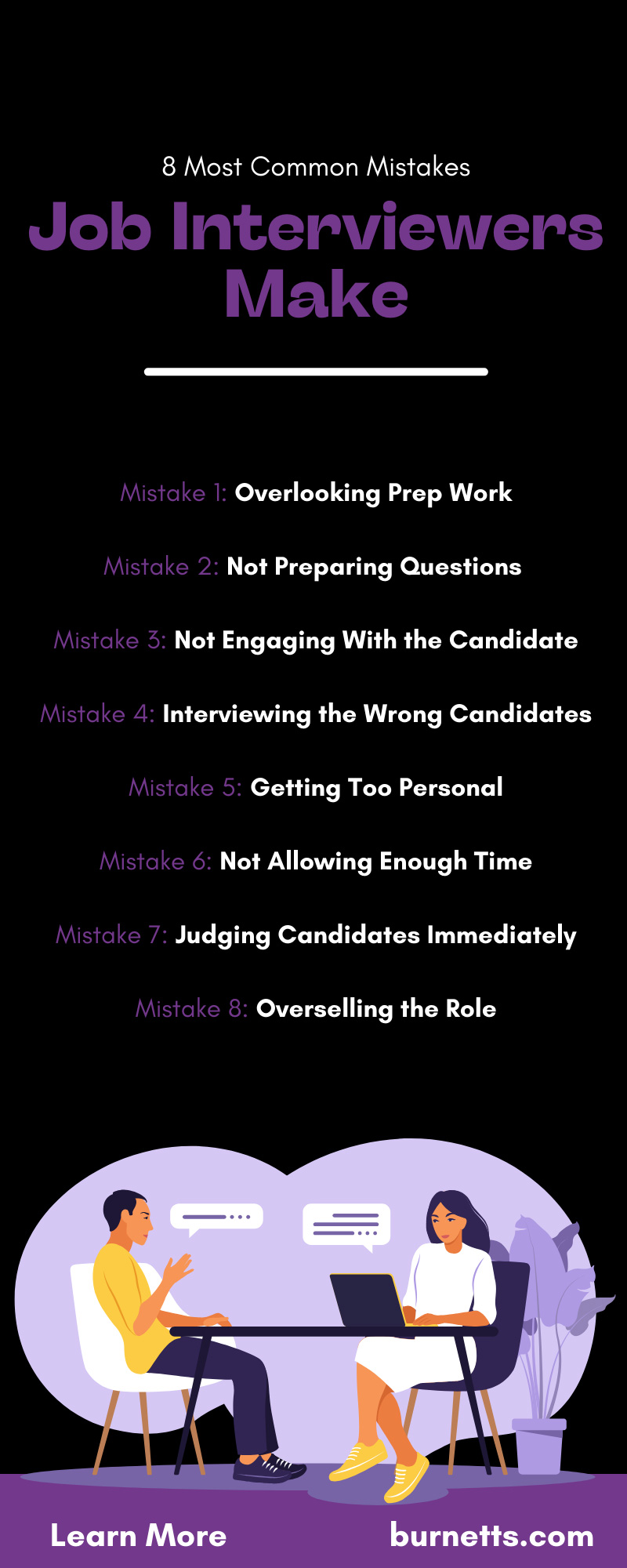Once you post your job listings, you’ll have to review numerous resumes and schedule interviews with your top picks. Properly conducting an interview makes it easier for you to hire the best people for the role. Learn about the most common mistakes job interviewers make to prevent mishaps.
Mistake 1: Overlooking Prep Work
While people often assume that interviews are the employer’s chance to assess the applicant, it’s a two-way street. Therefore, as the employer, preparing is vital since the candidate judges whether they want to work for you, just as you judge if you want to hire them. Do the following before the interview:
- Review the candidate’s resume and cover letter.
- Research their background.
- Prepare relevant questions that relate to their qualifications and experience.
Moreover, review the details for the open role so you know what to look for in the candidate. You should also take time to organize the space in which you’ll interview the individual; eliminate any clutter so your workplace looks professional.
If you’re underprepared, the candidate may question your company’s level of efficiency, which can discourage them from accepting the job offer. As a result, you may miss out on incredible hires—don’t let that happen.
Mistake 2: Not Preparing Questions
As an employer, you should have questions you ask each and every candidate to rate and compare their responses. Prepare general and job-specific questions relating to company culture, work ethic, and technical skills. The more you learn about a candidate, the easier it is to determine whether they’d be an ideal fit for the role and your company.
Moreover, posing questions encourages candidates to expand on information listed in their resume or cover letter. For example, you could ask, “You mentioned that you have experience in customer service. Can you tell me about a time when you went above and beyond for a customer?” This question allows the candidate to showcase their skills and experience while providing insight into their personality and work ethic.
Key Questions To Ask
As you prepare your list of questions, here are some great ones to consider:
- Why did you apply for this position?
- What’s your greatest strength and weakness?
- Where do you see yourself in five years?
- What does your work ethic look like?
- How do you cope with work stress?
Ensure all the questions you ask are open ended so the candidate provides you with plenty of information. Also, always ask candidates what questions they have for you. A prepared job seeker comes to the interview with at least one question.
Mistake 3: Not Engaging With the Candidate
Interviews can be nerve-racking, and a candidate sometimes may need some encouragement to open up and express themselves fully. That’s why one common mistake that interviewers make is not engaging with candidates. Creating a relaxed and friendly environment that nurtures two-way communication is important.
You should appear engaged throughout the conversation. Active listening skills convey interest in what the candidate has to say. Maintain eye contact, nod, or smile to encourage the candidate to continue sharing their experiences and qualifications. Moreover, ask follow-up questions to clarify any information that may be unclear or to delve deeper into a specific topic. This will also show your genuine interest in learning more about the candidate’s skills and abilities.
Mistake 4: Interviewing the Wrong Candidates
Some hiring managers think the faster you move through the process, the better. However, in the eagerness to fill an opening, an interviewer may hastily schedule candidate interviews without properly evaluating candidates’ resumes, online presence, and pre-screening assessments. This may result in scheduling interviews with individuals unsuitable for the position.
Mistake 5: Getting Too Personal
While asking questions and making conversation is acceptable, it should never get overly personal. Avoid questions unrelated to the job, such as race, marital status, religion, or age. Inquiring about this information may lead to legal violations and create an inauthentic interview experience.
Instead, stick to the job-related questions, and let the candidate share any personal information they feel comfortable with. However, you can ask what they like doing after work to learn more about the individual’s hobbies. If they share interests, such as a love for hiking, with you or other team members, they’re more likely to fit in with the workplace culture.
Mistake 6: Not Allowing Enough Time
As you schedule the interview, ensure you allocate sufficient time for the interview process—don’t rush through it. Lack of adequate time may lead to asking rushed questions or failing to evaluate all the job requirements. As a result, you’ll have a harder time deciding whether the individual is a good fit for the role. Ideally, an in-person interview should take 30 to 60 minutes; aim for an hour to avoid running out of time.
Mistake 7: Judging Candidates Immediately
Making snap judgments during the interview process is easy, especially when you feel pressed for time or have a lot of candidates to review. However, this judgment can lead to missing out on great potential employees. Instead, focus on the candidate’s qualifications and experience, and ask open-ended questions that allow them to showcase their skills and personality.
For example, an interviewee may not possess the desired experience level, but they could be a recent college graduate who has acquired the required education for the role. You may miss out on an amazing worker by passing judgment early on and acting uninterested during the interview. Treat each applicant like a potential employee during the interview; reserve passing judgment until you review your notes.
Mistake 8: Overselling the Role
Employers need to be honest and upfront about job descriptions, pay, and benefits. Overselling the role can result in an employee leaving the company soon after hiring on or not performing as well as expected. You risk increasing your company’s turnover rate by making promises you can’t keep.
Work With Burnett’s Staffing
Conducting successful job interviews entails adequate preparation and creating an environment for open and friendly communication. However, this takes time, and most managers would rather focus on company-specific duties. For help finding the best job candidates, collaborate with Burnett’s Staffing. You’ll keep your company thriving with the perfect team of workers! Contact Burnett’s Staffing for job recruiters in Dallas–Fort Worth, Texas, as you add workers to your team.


